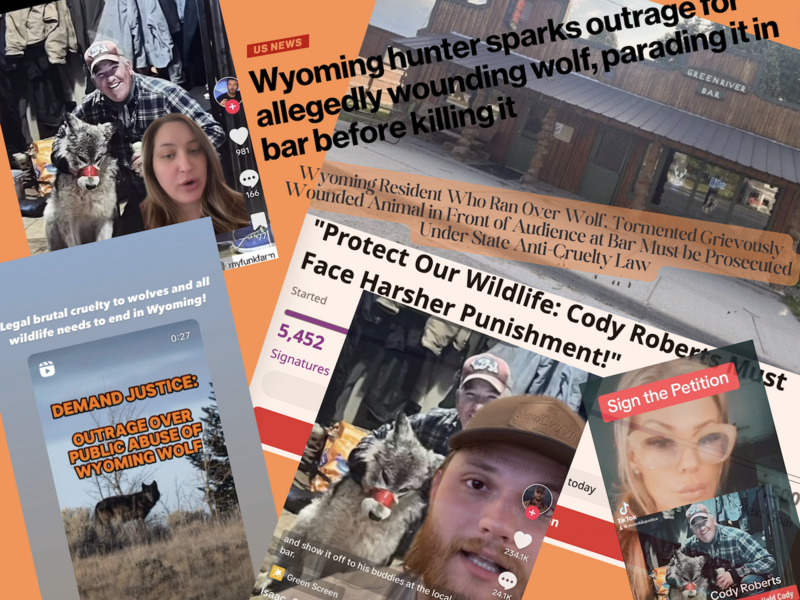Wyoming wolf torture case a ‘trigger’ for new Endangered Species Act lawsuit

Allegations that a Wyoming man captured, tortured and killed a wolf have sparked outrage across the world and prompted a wave of social media posts. One image published by Cowboy State Daily purports to show the man, Cody Roberts, posing for a photograph next to a wolf with its jaws taped shut. (collage by Tennessee Watson/WyoFile)
Until a few weeks ago, Wayne Pacelle was undecided whether he’d join the fray of lawsuits challenging the federal government’s decision to allow western states to continue managing gray wolves.
Then the news cycle spun toward Sublette County, where local resident Cody Roberts is accused of running down a wolf with a snowmobile on Feb. 29, capturing the critically wounded animal, taping its mouth shut, and showing it off in a bar for hours before finally killing it — actions that have thus far only earned Roberts a $250 fine.
Pacelle, a former CEO of the Humane Society of the United States, made up his mind.
“It was certainly a trigger for me,” he said. “We were thinking about it, and to me what [the incident] represented was everything that’s wrong with Wyoming’s handling of wolves.”

On Tuesday, Pacelle’s new employer, Washington, D.C.-based Animal Wellness Action, and five other groups notified the U.S. Fish and Wildlife Service they intended to sue over wolf jurisdiction.
The advocacy organizations emphasized the now-infamous animal cruelty incident in a press release announcing their lawsuit. The official 20-page legal notice of intent to sue, however, only mentioned the event in a single paragraph. Kate Chupka Shultz, the attorney representing the groups, called what happened an example of “wanton and egregious cruelty not seen for decades.”
This wasn’t the first time the U.S. Fish and Wildlife Service recently learned it was being sued by groups that argue Northern Rockies wolves should regain Endangered Species Act protections. The federal agency, which denied petitions to list the species in February, has already been hit with a separate lawsuit brought by groups that notified the government of their intent immediately after the no-listing decision.
That 48-page complaint, brought on behalf of 10 western advocacy groups, does not mention the wolf incident in Daniel, which entered the news cycle a week before the document’s April 8 file date. Nevertheless, at least one of the plaintiffs believes that the global condemnation for what took place in rural western Wyoming could play a role in the case.
“One of the primary claims in our lawsuit is that Wyoming has inadequate regulatory mechanisms to keep wolves at healthy population levels,” Western Watersheds Project Executive Director Erik Molvar told WyoFile. “The crime that was committed by Cody Roberts is exhibit A, demonstrating that the state of Wyoming has no interest at all in protecting wolves.”

Otherwise, the lawsuit argues that the Fish and Wildlife Service relied on a “scientifically invalid” model assessing the viability of wolves in the Northern Rockies’ “distinct population segment” of wolves, he said. Another claim concerns smaller populations of wolves in states outside of Montana, Idaho and Wyoming.
The pending lawsuit from Animal Wellness Action and the other groups includes some overlapping claims. The notice of intent to sue charges that Fish and Wildlife ignored the best-available science and that “politics and socio-political sentiment” threaten “the species’ continued existence.” Another claim is that federal wildlife managers failed to analyze the “danger of” gray wolf “extinction in all or a significant portion of its range.”
Generally, western wolves have thrived since their reintroduction to Yellowstone National Park and the Idaho wilderness complex in the mid-1990s. Wyoming wolf populations have been stable, last estimated at the 314 animals, though the species is intentionally confined to the far northwest corner by the state’s predator-zone policy. Permissiveness for how wolves can be legally killed in this area — by virtually any method — factored into Game and Fish’s decision to cite Roberts only $250 for illegal possession of warm-blooded wildlife.
The Wyoming Game and Fish Commission has pushed back on arguments that the Daniel wolf incident says anything about the state’s suitability to manage wolves. “This incident, perpetrated by one individual, does not represent a failure in wildlife policy or management,” commissioners said in a statement.








